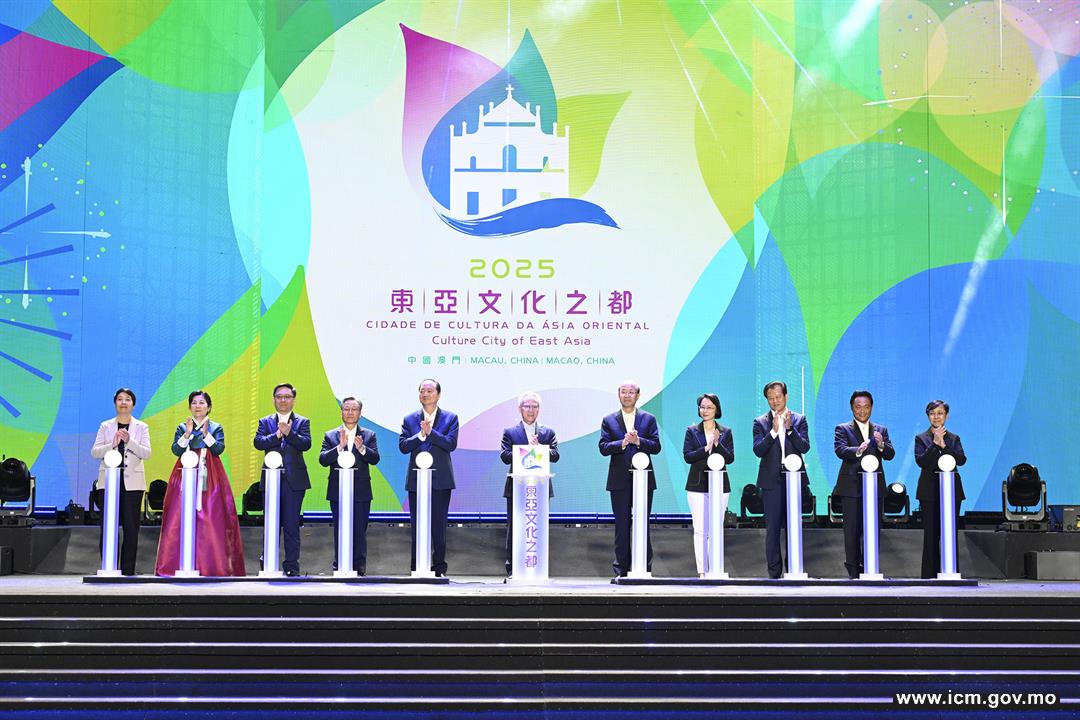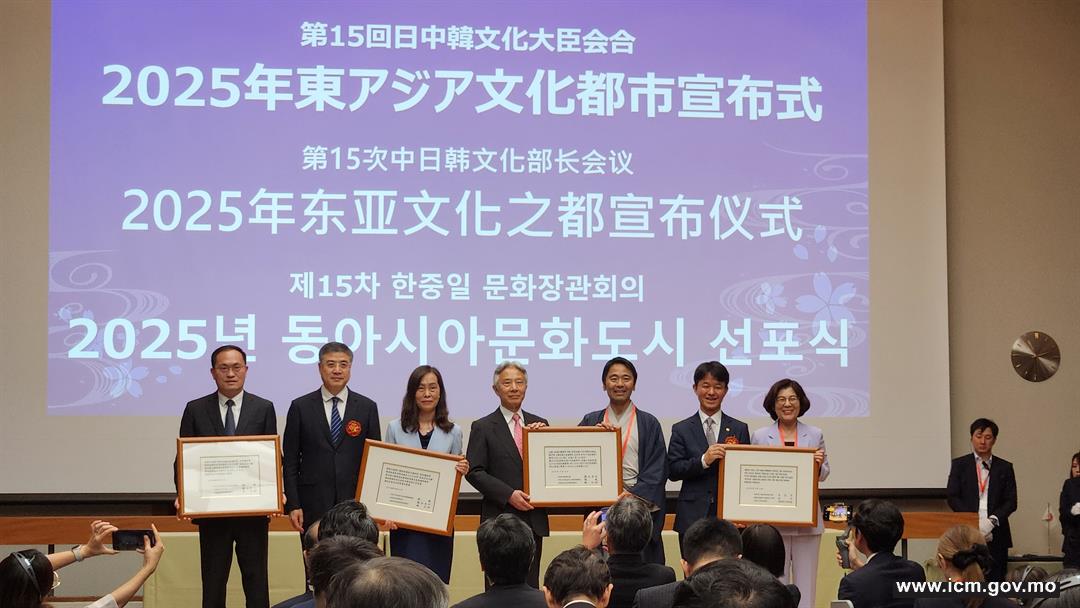Background
The programme “Culture City of East Asia”, an initiative jointly launched by China, Japan and South Korea, stems from the consensus and spirit of the China-Japan-South Korea Trilateral Summit. It is Asia’s first international cultural city designation event, representing a major cultural achievement between the three countries, and a hallmark of East Asian regional cultural collaboration. Selected cities are required to promote their rich and distinct local cultural resources and characteristics while also embodying the essence of East Asian culture, thereby playing a leading and exemplary role in promoting cultural exchange and mutual learning in East Asia.
In support of Macao’s bid to become a “Culture City of East Asia”, the Macao SAR Government specially set up a dedicated working group, which is responsible for the urban development work and the preparation, planning, implementation and management of the programme locally. The expert members of the Ministry of Culture and Tourism evaluated the candidate cities in terms of their cultural and artistic creation systems, preservation and transmission of outstanding traditional culture, public cultural service systems, cultural promotion and exchange, cultural industries and consumption, tourism products and services, integrated development of culture and tourism, and urban cultural characteristics, and six candidate cities were shortlisted for the final evaluation stage within this ground-breaking programme.
In May 2024, a delegation of the Macao SAR Government led by the former Secretary for Social Affairs and Culture travelled to Beijing to participate in the final evaluation for the “Culture City of East Asia 2025”. Macao received unanimous high recognition from all jury members for its outstanding development plan, passed the final evaluation, and won the prestigious distinction with top ranking marks. On 12 September 2024, the award ceremony of the title of “Culture City of East Asia 2025” was held during the 15th China-Japan-Republic of Korea Culture Ministers’ Meeting in Kyoto, Japan. Representatives of cultural departments of the three countries awarded the plaques with the prestigious designation to representatives of Macao SAR (China), Huzhou (China), Anseong (South Korea), and Kamakura (Japan), adding another glittering hallmark to Macao as an international metropolis.
From Cultural Foundation to Glittering Hallmark
Macao’s unique allure comes from its historical legacy as a pivotal node and trading hub on the Maritime Silk Road. The arrival of Portuguese trading ships over four centuries ago not only brought trade, but also positioned Macao as a key player in East Asian cultural exchange, initiating a dialogue and fusion of Eastern and Western civilisations. Against this unique historical backdrop, from the incense-filled ambience of A-Ma Temple to the weathered stone steps of the old Church of Mater Dei, and from the melodious Cantonese opera to the fragrant Macanese cuisine, Macao’s cultural DNA embodies both the roots of Chinese civilisation and the chemistry of East-West interaction. This core identity of “Chinese culture as the mainstream with the coexistence of diverse cultures” is the precise cultural foundation on which Macao was selected as a “Culture City of East Asia”.
Since its return to the motherland, Macao has benefited from the institutional advantages of the “one country, two systems” policy. With strong support from the Central Government, the city has experienced rapid social development and increasing internationalisation. At the same time, Macao has capitalised on its profound historical heritage, transforming its traditional cultural resources into a vital driving force for modern development. Historic buildings have been revitalised into public libraries, exhibition centres, and various other functional spaces that are essential to the city. Numerous historic districts serve as venues for important festivals, allowing Macao’s unique culture to be passed on in everyday life, while establishing the city as a fascinating blend of Chinese and Western cultures. Macao has since received three international prestigious designations, namely: “World Heritage Site”, “Memory of the World Register” and “Creative City of Gastronomy”. The “Culture City of East Asia” accolade will be another glittering hallmark for Macao, demonstrating recognition for Macao SAR Government’s long-term commitment to cultural development. It will also help to deepen Macao’s exchanges with East Asian nations, contributing to the Belt and Road Initiative, and fully integrating the city into the nation’s overall development vision plan, thereby raising Macao’s profile as an international metropolis through its vibrant culture.
From Mission to Action
The “Culture City of East Asia” designation carries a vision of promoting mutual learning among different nations and deepening people-to-people exchanges. Therefore, Macao’s designation as a “Culture City of East Asia 2025” is not only a recognition of the city’s centuries-old position as a meeting point for Eastern and Western cultures, but also brings forward an inherent sense of mission and responsibility for the future. As Macao enters 2025 with the title of “Culture City of East Asia”, its goal is not only to showcase itself, but also to build a cultural bridge between China, Japan and South Korea, with a wider reach and presence across East Asia. To this end, the Macao SAR Government, building on Macao’s historical significance as a key node on the Maritime Silk Road and its historic contribution to East-West exchanges on economy, technology, and culture in the modern era, has chosen “East-West Encounter, Asia in Harmony” as the theme for the programme of the “Culture City of East Asia 2025 – Macao, China”. The programme will feature a series of activities organised into four sections, respectively entitled “Setting Sail”, “Riding the Waves”, “Chasing the Moon”, and “Returning with Abundance”, symbolising a cultural voyage of exploration from departure to rich harvest. These activities will integrate East Asian cultural elements and use culture as a deeply meaningful bond to facilitate exchanges in culture and arts, thereby highlighting Macao’s long-standing maritime culture and showcasing the city’s inclusiveness and innovative spirit to be shared with the world.
Within this framework, the Macao SAR Government will incorporate more East Asian cultural elements into its various annual events and host a greater number of internationally appealing cultural performances and exchange activities. These initiatives will provide both residents and travellers with quality cultural tourism experiences with Chinese, Japanese and Korean elements. To promote the core values of “coexistence, innovation, and harmony” of the Culture Cities of East Asia, the Cultural Affairs Bureau will launch several exchange and cooperation projects, including inviting artists from China, Japan and South Korea to jointly create artistic works for public display as a cultural legacy of the “Culture City of East Asia 2025” programme. Additionally, there are plans to commission the Macao Chinese Orchestra to collaborate with Chinese, Japanese and Korean artists to create musical masterpieces that embody cultural fusion, using Chinese national orchestral music as a foundation and incorporating representative instruments and cultural elements from Japan and South Korea. Furthermore, we are planning to launch the exchange travel programme “Culture City of East Asia – Macao, China – University’s Student Cultural Ambassadors”, in order to provide Macao’s university students with an in-depth experience of East Asian culture and arts, further broadening their international perspectives and fostering larger scale intercultural exchange. Through these diverse activities and interactions, the programme aims to further cultivate students’ humanistic vision and artistic proficiency, sowing the seeds of friendship among young people from Macao, Japan and South Korea, while elevating cultural exchange from isolated “events” into a more continuous and enduring “mechanism”.
Taking China's Story to the World
In 2025, Macao has unfurled its cultural sails and embraced the three key roles assigned to it by the nation, aiming to fully accomplish its role as: a world tourism and leisure centre, a commercial and trade co-operation service platform between China and Portuguese-speaking countries, and a base for exchange and cooperation where Chinese culture is the mainstream and diverse cultures coexist. Macao will be transformed from a historic gateway into a hub connecting China with the world, particularly Portuguese-speaking countries and regions, and a centre for mutual learning between nations. While attracting visitors from around the globe, Macao will also promote outstanding Chinese culture to the world. Through this international cultural exchange platform, Macao will build cultural ties among cities, promoting further dialogue among Asian nations, and showcasing the brilliance of Chinese culture on the world stage through international arts and cultural events, thereby telling China’s story in an effective manner that can be shared and enjoyed by all.

Opening ceremony of the programme “Culture City of East Asia 2025 – Macao, China”

Award ceremony of the title of “Culture City of East Asia 2025”